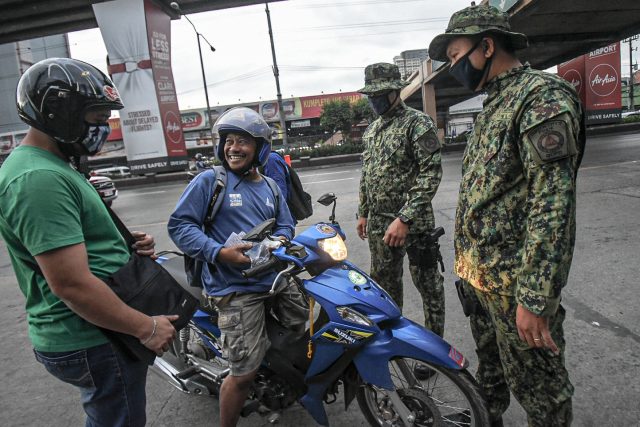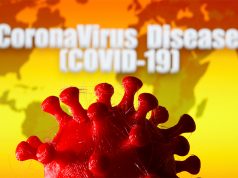(UPDATED 8:39 p.m.) Human rights advocates recently reminded Filipinos of their legal rights amid fears of potential public arrests and detention during the implementation of a community quarantine.
This, despite the justice department’s assurance that public arrests cannot be made over quarantine violations.
Duterte raised Code Red Sublevel 2 on the evening of March 12 and implemented a monthlong community quarantine period over Metro Manila starting from March 15 to April 14 to prevent the further spread of COVID-19 in the country.
Several mayors in Metro Manila later imposed a nine-hour curfew from 8 p.m. to 5 a.m. in their jurisdictions.
As of March 16, Palace announced the enhanced community quarantine that would be implemented throughout Luzon.
In his nation’s address last Thursday, President Rodrigo Duterte said those who would violate the rules including prohibition on mass gatherings and conduct of rallies during the community quarantine would be punishable by law.
“From a simple violation of a rule, it will now ripen into a crime that is punishable by law and you can go to prison. That’s the problem. Ayaw ko. Ayaw ko. Ayaw ko na masita kayo ng military pati pulis. But ako sa inyo, if you are advised, just obey,” he said.
He made a similar warning against students who refuse to study at home.
“Avoid trouble with the law, avoid trouble with anybody, just in the meantime, follow. Better just stay home and study. That is my advice. Pero kung ayaw ninyong sundin, you stick with your cellphone, ang ga-graduate niyan ang cellphone mo hindi ikaw,” Duterte said.
READ: FULL TEXT: Public address of President Rodrigo Duterte on the Coronavirus Disease 2019 (COVID-19)
However, Justice Secretary Menardo Guevarra reminded the public that law enforcers cannot arrest people who violate travel restrictions and curfew regulations.
Warrantless arrests can only be made in case of physical assaults, slander and bribery.
“If the person assaults the law enforcement agent, or slanders him, or bribes him, then that’s cause for warrantless arrest,” he said.
For better understanding, human rights organization Karapatan re-shared its previous infographic on the Filipinos’ constitutional rights in case they are arrested or detained. These rights are enshrined in Republic Act 7438 or the law “defining certain rights of person arrested, detained or under custodial investigation as well as the duties of the arresting, detaining and investigating officers, and providing penalties for violations thereof.”
These rights can also be found in the 1987 Constitution and other related laws.
Know your rights! In light of the threats of raids and arrests, remember: stay calm, be observant, assert your rights, demand access to a phone, and ask the name and rank of your arresting officer.
Feel free to share, download, and print our paralegal bust card! #StopTheAttacks pic.twitter.com/SAGTZbXVS7
— Karapatan (@karapatan) November 5, 2019
Karapatan first posted it in November 6 last year during the alleged crackdown of progressive or leftist groups in the country.
Human rights lawyer Chel Diokno, a former opposition senatorial bet, also shared the same advice in a series of tweets.
“Pwede ka nilang harangin at wag papasukin, na tama lang naman kung kailangan, pero hindi ka nila pwedeng arestuhin at ikulong dahil hindi naman krimen ang subukang pumasok sa Metro Manila,” Diokno said.
Likened to martial law
Kabataan Partylist shared a thread showing screenshots of social media testimonies of supposed intimidation during the first day of the quarantine handled by the military and the police.
This is Metro Manila under AFP-PNP lockdown
A THREAD
— Kabataan Partylist (@KabataanPL) March 15, 2020
Student activist Albert Pagunsan, meanwhile, explained that critics’ views comparing the lockdown to what happened during martial law is due to the increased presence of the military force.
“I do not think that people are absolutely against a curfew or a lockdown. People just fear and question people in authority who are managing curfews, lockdowns,” Pagunsan said in a Twitter thread.
[A thread on Martial Law]
I do not think that people are absolutely against a curfew or a lockdown. People just fear and question people in authority who are managing curfews, lockdowns. (1/5)
— Albert | #FreeTacloban5 #SOGIEEqualityNow (@albert_pagunsan) March 14, 2020
Security forces should also be guided by medical and social science expertise.
“AFP-PNP are essential to a lockdown but shouldn’t their acts be guided by medical and social science expertise and multiperspective approach with a pro-people and pro-poor lens? Thus, the fear of Martial Law,” Pagunsan said.
In her radio program last Sunday, Vice President Leni Robredo lamented how the concern on public order and safety overshadows health concerns.
“Sana hindi grabe ‘yung focus sa military, sa kapulisan kasi ito, health concern ito,” she was quoted as saying.










